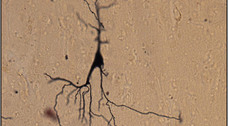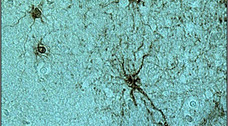
One of the main interests of the MGSS is the understanding of molecular and cellular changes taking place in the brains of individuals that become depressed and commit suicide. Biological studies at the MGSS are translational in nature, that is, they investigate, in humans, concepts and findings from basic neuroscience research. These studies are divided in the following 3 main areas:
Molecular genetics, genomics and epigenetics
These studies are concerned primarily with the effect of gene structure, gene function and gene regulation on depression and suicide. They try to identify gene and/or gene systems that function at different levels in the brains of individuals who died by suicide as compared to control individuals. Subsequently, these studies try to understand the mechanisms accounting for these differences. Over the last years, the MGSS has carried a large number of such studies. We have also been conducting studies to understand how the environment interacts with the genome, resulting in altered gene function. This line of investigation is particularly promising as it is common to observe important environmental stressors, such as a history of early childhood adversity, among individuals who died by suicide.
The following are studies that illustrate this approach:
- Implication of SSAT by gene expression and genetic variation in suicide and major depression. Sequeira A, Gwadry FG, Ffrench-Mullen JM, Canetti L, Gingras Y, Casero RA Jr, Rouleau G, Benkelfat C, Turecki G. Arch Gen Psychiatry. 2006 Jan;63(1):35-48.
- Epigenetic regulation of the glucocorticoid receptor in human brain associates with childhood abuse.
McGowan PO, Sasaki A, D'Alessio AC, Dymov S, Labonte B, Szyf M, Turecki G, Meaney MJ. Nat Neurosci. Mar 2009;12(3):342-348.
- Alternative splicing, methylation state, and expression profile of tropomyosin-related kinase B in the frontal cortex of suicide completers.
Ernst C, Deleva V, Deng X, Sequeira A, Pomarenski A, Klempan T, Ernst N, Quirion R, Gratton A, Szyf M, Turecki G. Arch Gen Psychiatry. Jan 2009;66(1):22-32.
Cellular neuroanatomy
It is currently hypothesized that depression may arise from the inability of brain circuitries to adapt to variations in cerebral activity. To test this hypothesis, we are conducting several projects aimed at investigating the fine neuroanatomical manifestations of such altered plasticity in postmortem brains from depressed suicide subjects. These studies are focused on limbic brain regions, namely the hippocampus, amygdala and anterior cingulate cortex, which are well known for their implication in emotional processing.
 |
 |
| Fig. 1: Pyramidal neuron in the deep layers of the anterior cingulate cortex. | Fig. 2: Astrocytes expressing glial cell line-derived neurotrophic factor (GDNF) in the amygdala. |
Consult the following studies:
- Anterior cingulate pyramidal neurons display altered dendritic branching in depressed suicides.
Hercher C, Canetti L, Turecki G, Mechawar N. J Psychiatr Res. 2010 Apr;44(5):286-93.
- Alcohol dependence-related increase of glial cell density in the anterior cingulate cortex of suicide completers.
Hercher C, Parent M, Flores C, Canetti L, Turecki G, Mechawar N.J Psychiatry Neurosci. 2009 Jul;34(4):281-8.
- Through the looking glass: examining neuroanatomical evidence for cellular alterations in major depression.
Hercher C, Turecki G, Mechawar N. J Psychiatr Res. 2009 Jul;43(11):947-61.
Lipid metabolism
Over the last decades, researchers have been puzzled by the consistent evidence suggesting that low cholesterol levels may be associated with suicidal and related behaviors. While this association remains controversial, there is growing data suggesting that cholesterol and other lipids play an important role in brain plasticity and may modulate behavior as a response to dietary needs. Our group has been interested in the investigation of these interesting relationships.
The following are studies that illustrate this line of investigation:
- Cholesterol metabolism and suicidality in Smith-Lemli-Opitz syndrome carriers. Lalovic A, Merkens L, Russell L, Arsenault-Lapierre G, Nowaczyk MJ, Porter FD, Steiner RD, Turecki G. Am J Psychiatry. 2004 Nov;161(11):2123-6.
- Cholesterol content in brains of suicide completers. Lalovic A, Levy E, Luheshi G, Canetti L, Grenier E, Sequeira A, Turecki G. Int J Neuropsychopharmacol. 2007 Apr;10(2):159-66. Epub 2006 May 17.
- Fatty acid composition in postmortem brains of people who completed suicide. Lalovic A, Levy E, Canetti L, Sequeira A, Montoudis A, Turecki G. J Psychiatry Neurosci. 2007 Sep;32(5):363-70.
- Altered expression of lipid metabolism and immune response genes in the frontal cortex of suicide completers.
Lalovic A, Klempan T, Sequeira A, Luheshi G, Turecki G. J Affect Disord. 2010 Jan;120(1-3):24-31.


